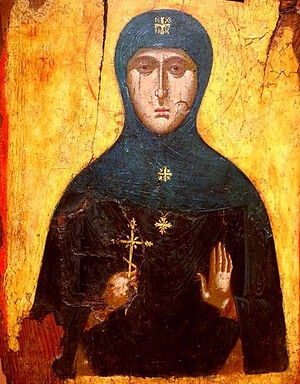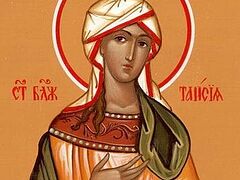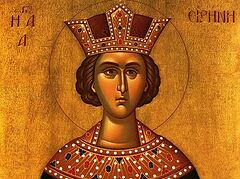 St. Matrona of Constantinople Christ is in our midst, my dear readers!
St. Matrona of Constantinople Christ is in our midst, my dear readers!
The Lives of the Saints are ageless. They are always relevant, regardless of the times in which their heroes lived. Venerable Matrona of Constantinople lived in the fifth century. Her marriage was not a happy one, she had to endure her husband’s attacks, she suffered from him but did not divorce him. How lightly today certain priests decide the fates of families. You have a bad husband, he doesn’t let you go to church, blasphemes God? Leave him and save yourself alone. But it sometimes happens that after abandoning one cross, the woman who listened to the woebegone priest condemns herself to a worse one.
Instead of complaining about her husband, St. Matrona wept over her sins and prayed for her spouse, so that he would believe in Christ. She left her husband only after a extraordinary divine vision, which commanded her to take the monastic path. She didn’t leave her home in order to lighten her life, but in order to make her podvig even more severe. Unfortunately if sometimes happens that people join a monastery because their lives didn’t work out: Their husbands are bad, their children don’t love them, they can’t find a job, and so on. But the passions don’t leave those people alone there either, because you can’t run away from yourself.
What was St. Matrona looking for in monasticism? Glory? Honor? Reverence? No, she even dressed in men’s clothing so that no one would recognize her, and spent all her time in silence, fasting, and prayer. And what is amazing, it is precisely the person who flees human talk and glory whom God glorifies most of all not only in eternity, but not rarely in earthly life as well. Such was the path of St. Matrona of Constantinople. No matter how she hid herself, God glorified her all the more. The venerable one had left, you could say, for the edge of the earth in order to hide herself from human glory, but there a monastery formed around her. Finally, the Lord lead her back to Constantinople, where she lived out her days as the abbess of one of the most honored monasteries, and while still alive she was vouchsafed to see sweet paradise, whence her pure soul departed. What a wondrous and well-lived, wholesome life that holy woman lived.
And now look around you. To what lengths of vileness and meanness won’t certain public figures go in order to raise their rating and become famous. But how does it end? As a rule, ingloriously and eternally shamefully. And in general, what is the value of human glory? Who now remembers, for example the names of movie stars whose names even little children knew in the sixties? Now few even know the names of people who played key roles in the history of our nation. I’m not even talking about the glory that today is, but tomorrow as if sinks into the sea. That is how it is with people, but not with God. The glory that He gives to people never dies and never fades. And that after hundreds of years we still know the name of a woman saint who lived in fifth-century Constantinople is testimony to this.




